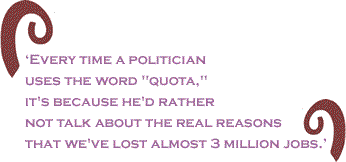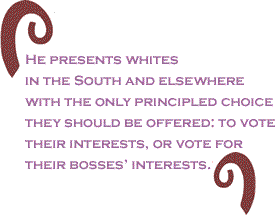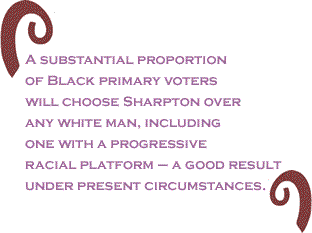
|
|||||||||||||||||||||
|
Howard Dean’s December 7 speech is the most important statement on race in American politics by a mainstream white politician in nearly 40 years. Nothing remotely comparable has been said by anyone who might become or who has been President of the United States since Lyndon Johnson’s June 4, 1965 affirmative action address to the graduating class at Howard University. For four decades, the primary political project of the Republican Party has been to transform itself into the White Man’s Party. Not only in the Deep South, but also nationally, the GOP seeks to secure a majority popular base for corporate governance through coded appeals to white racism. The success of this GOP project has been the central fact of American politics for two generations – reaching its fullest expression in the Bush presidency. Yet a corporate covenant with both political parties has prohibited the mere mention of America’s core contemporary political reality: the constant, routine mobilization of white voters through the imagery and language of race. Last Sunday, Howard Dean broke that covenant:
A defining moment
Not since Lyndon Johnson vowed to harness the power of the federal government to redress the historical grievances of Black America has a potential or sitting President made such a clear case against racism as a political and economic instrument – and even Johnson failed to indict corporate interests, or anyone in particular, for wielding race as a political weapon. Howard Dean points the finger straight at executive boardrooms, and directly implicates members of his own party in the coded conspiracy.
At Howard University Lyndon Johnson established a muscular, principled, historically-rooted rationale for vigorous affirmative action as national public policy. Johnson then announced “a White House conference of scholars, and experts, and outstanding Negro leaders – men [sic] of both races – and officials of Government at every level. This White House conference's theme and title will be ‘To Fulfill These Rights.’” Johnson spent the better part of the next three and a half years forcing legislation through Congress to “fulfill” those rights, as broadly demanded by the Civil Rights Movement.
Bill Clinton – the ridiculously dubbed “Black” President – began his 1992 campaign by staging an ambush of Sister Souljah to impress white males, dedicated his second term to elimination of “welfare as we know it,” and ended his tenure with a purposeless national “conversation on race” that went nowhere by design. Howard Dean has taken history in his hands by hitching his ascendant campaign to a straightforward, anti-corporate message that does not pander to white racism. He presents whites in the South and elsewhere with the only principled choice they should be offered: to vote their interests, or vote for their bosses’ interests (if they are lucky enough to have a job). Although corporate media called Dean’s statement his “southern strategy,” it is in fact the only position that holds out any hope for a national Democratic victory in 2004 – whether enough southern whites emerge from their racist “false consciousness” or not. The December 7 speech is a clear and definitive break from the lethal grip of the Democratic Leadership Council, the southern-born, corporate-mouthpiece faction of the party. The DLC’s favored presidential candidate is Senator Joe Lieberman, its most illustrious personality is Bill Clinton, and its most prestigious founding member is none other than – Al Gore. Gore’s endorsement of Dean should be viewed as head-swiveling proof of the bankruptcy of the DLC’s white “swing voter” strategy. The DLC-Emeritus has effectively jumped ship. Stay the course
Where does this leave Al Sharpton and Dennis Kucinich? Exactly as they are, preaching the same social democratic, anti-racist, pro-peace message as before, for as long as their energies can sustain them. Dean’s political leap would not have been possible in the absence of Sharpton’s energetic Black candidacy and Kucinich’s principled, progressive white voice from the Left. At this historic juncture they dare not go anywhere. Dean has picked up the torch that Sharpton and Kucinich have been carrying and they must stay in the race to make sure he doesn’t set it down. By persevering in pressing the Left edges of the Democratic envelope, the “Two Civilized Men” created the political space for Dean to make his historic break. Although we cannot expect either candidate to rejoice in the frontrunner’s actions, Dean’s leftward march is also their victory over the DLC, and they must defend it – against Dean himself and his newfound allies, if need be. On the anti-war front, Dean continues to waffle on the nature and length of the Iraq occupation, which makes him an apologist for American Manifest Destiny. Kucinich and Sharpton are the only candidates who call for unequivocal withdrawal. Their job is by no means over. Sharpton’s singular mission remains the same as when he first declared for the presidency: to present himself as the Black candidate. African Americans are sophisticated, and understand the value of a demonstration; many will vote for Sharpton as a way to make the weight of their electoral presence unmistakably felt. A substantial proportion of Black primary voters will choose Sharpton over any white man, including one with a progressive racial platform – a good result under present circumstances, and one we expect in South Carolina, February 3. (South Carolina Black Rep. James Clyburn has endorsed his congressional colleague, Dick Gephardt.) Only two people can shut the window that Howard Dean threw open for the national Democratic Party, last Sunday: Dean and Al Sharpton. Dean’s Black advisors, especially Congressman Jesse Jackson, Jr., must caution the former Vermont Governor that their presence in his camp does not convey Blackness to the candidate. He must respect and acclimate himself to Sharpton’s mission. Sharpton must remember that he is not running for King of the Blacks, but is essentially acting as the lead Black organizer in the progressive wing of the Democratic Party. Dean’s December 7 statement would certainly not have been written without Sharpton in the race. That is a great victory of the Sharpton campaign, one that may shape the future of the nation. Indeed, Sharpton could have vetted Dean’s speech, which reads very much like the distilled product of A More Perfect Union, the book written by Rep. Jackson and Frank Watkins, Sharpton’s former campaign manager. The same river runs through it, the historical currents that also informed Rev. Jesse Jackson’s speech to South Carolina State University at Orangeburg, last week. "The big fight in this state should be trade policy and the Wal-Martization of our economy," said Jackson, the local Times and Democrat reported. "The challenge is to get South Carolina to vote its economic hopes and not its racial fears." Most low-income Americans are white and "they work every day. They work at Wal-Mart without insurance. They work at fast-food places. They work at hospitals where no job is beneath them, where they don't have insurance, so they can't afford to lay in the beds they make… "The challenge for South Carolina is to move from racial battleground to economic common ground to moral high ground." Those sentiments spring from the Black Political Consensus. Howard Dean is attempting to get the Democratic Party – and himself – in step. That’s how history is made. With absolute certainty that the corporate media have thoroughly misreported, mangled and incompetently framed Howard Dean’s December 7 speech, we have republished it in full, below. From the Official Howard Dean Weblog, December 7, 2003 http://blog.deanforamerica.com/archives/002565.html Restoring the American Community The following remarks as prepared were delivered this afternoon by Governor Howard Dean in Columbia, South Carolina: In 1968, Richard Nixon won the White House. He did it in a shameful way – by dividing Americans against one another, stirring up racial prejudices and bringing out the worst in people. They called it the "Southern Strategy," and the Republicans have been using it ever since. Nixon pioneered it, and Ronald Reagan perfected it, using phrases like "racial quotas" and "welfare queens" to convince white Americans that minorities were to blame for all of America's problems. The Republican Party would never win elections if they came out and said their core agenda was about selling America piece by piece to their campaign contributors and making sure that wealth and power is concentrated in the hands of a few. To distract people from their real agenda, they run elections based on race, dividing us, instead of uniting us. But these politics do worse than that – they fracture the very soul of who we are as a country. It was a different Republican president, who 150 years ago warned, "A house divided cannot stand," and it is now a different Republican party that has won elections for the past 30 years by turning us into a divided nation. In America, there is nothing black or white about having to live from one paycheck to the next. Hunger does not care what color we are. In America, a conversation between parents about taking on more debt might be in English or it might be in Spanish, worrying about making ends meet knows no racial identity. Black children and white children all get the flu and need the doctor. In both the inner city and in small rural towns, our schools need good teachers. When I was in medical school in the Bronx, one of my first ER patients was a 13-year-old African American girl who had an unwanted pregnancy. When I moved to Vermont to practice medicine, one of my first ER patients was a 13-year-old white girl who had an unwanted pregnancy. They were bound by their common human experience. There are no black concerns or white concerns or Hispanic concerns in America. There are only human concerns. Every time a politician uses the word "quota," it's because he'd rather not talk about the real reasons that we've lost almost 3 million jobs. Every time a politician complains about affirmative action in our universities, it's because he'd rather not talk about the real problems with education in America – like the fact that here in South Carolina, only 15% of African Americans have a post-high school degree. When education is suffering in lower-income areas, it means that we will all pay for more prisons and face more crime in the future. When families lack health insurance and are forced to go to the emergency room when they need a doctor, medical care becomes more expensive for each of us. When wealth is concentrated at the very top, when the middle class is shrinking and the gap between rich and poor grows as wide as it has been since the Gilded Age of the 19th Century, our economy cannot sustain itself. When wages become stagnant for the majority of Americans, as they have been for the past two decades, we will never feel as though we are getting ahead. When we have the highest level of personal debt in American history, we are selling off our future, in order to barely keep our heads above water today. Today, Americans are working harder, for less money, with more debt, and less time to spend with our families and communities. In the year 2003, in the United States, over 12 million children live in poverty. Nearly 8 million of them are white. And no matter what race they are, too many of them will live in poverty all their lives. And yesterday, there were 3,000 more children without health care - children of all races. By the end of today, there will 3,000 more. And by the end of tomorrow, there will be 3,000 more on top of that. America can do better than this. It's time we had a new politics in America – a politics that refuses to pander to our lowest prejudices. Because when white people and black people and brown people vote together, that's when we make true progress in this country. Jobs, health care, education, democracy, and opportunity. These are the issues that can unite America. The politics of the 21st century is going to begin with our common interests. If the President tries to divide us by race, we're going to talk about health care for every American. If Karl Rove tries to divide us by gender, we're going to talk about better schools for all of our children. If large corporate interests try to divide us by income, we're going to talk about better jobs and higher wages for every American. If any politician tries to win an election by turning America into a battle of us versus them, we're going to respond with a politics that says that we're all in this together - that we want to raise our children in a world in which they are not taught to hate one another, because our children are not born to hate one another. We're going to talk about justice again in this country, and what an America based on justice should look like – an America with justice in our tax code, justice in our health care system, and justice in our hearts as well as our laws. We're going to talk about making higher education available to every young person in every neighborhood and community in America, because over 95% of people with a 4-year degree in this country escape poverty. We're going to talk about rebuilding rural communities and making sure that rural America can share in the promise and prosperity of the rest of America. We're going to talk about investing in more small businesses instead of subsidizing huge corporations, because small businesses create 7 out of every 10 jobs in this country and they don't move their jobs overseas – and they can help revitalize troubled communities. We're going to make it easier for everyone to get a small business loan wherever they live and whatever the color of their skin. We're going to talk about rebuilding our schools and our roads and our public spaces, empowering people to take pride in their neighborhood and their community again. We're going to talk about building prosperity that's based on more than spending beyond our means, a prosperity that doesn't force us to choose between working long hours and raising our children, a prosperity that doesn't require a mountain of debt to sustain it, a prosperity that lifts up every one of us and not just those at the very top. The politics of race and the politics of fear will be answered with the promise of community and a message of hope. And that's how we're going to win in 2004. At the Democratic National Convention in 1976, Congresswoman Barbara Jordan asked, "Are we to be one people bound together by common spirit sharing in a common endeavor or will we become a divided nation?" We are determined to find a way to reach out to Americans of every background, every race, every gender and sexual orientation, and bring them – as Dr. King said – to the same table of brotherhood. We have great work to do in America. It will take years. But it will last for generations. And it begins today, with every one of us here. Abraham Lincoln said that government of the people, by the people and for the people shall not perish from this earth. But this President has forgotten ordinary people. That is why it is time for us to join together. Because it is only a movement of citizens of every color, every income level, and every background that can change this country and once again make it live up to the promise of America. So, today I ask you to not just join this campaign but make it your own. This new era of the United States begins not with me but with you. United together, you can take back your country. |
December
11, 2003 |
||||||||||||
|
||||||||||||
|
|
||||||||||||
| Printer Friendly Version | ||||||||||||
| |
||||||||||||
| |
||||||||||||





















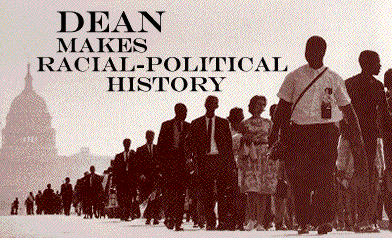
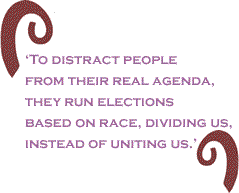
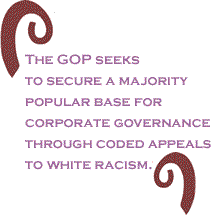 Dean’s Columbia, South
Carolina, statement is equal in political import to Lyndon
Johnson’s framing of the need for affirmative action, in 1965.
Prior to Johnson’s Howard University address, no sitting or
potential President since Reconstruction had drawn the straight
line that connects racism and poverty:
Dean’s Columbia, South
Carolina, statement is equal in political import to Lyndon
Johnson’s framing of the need for affirmative action, in 1965.
Prior to Johnson’s Howard University address, no sitting or
potential President since Reconstruction had drawn the straight
line that connects racism and poverty: